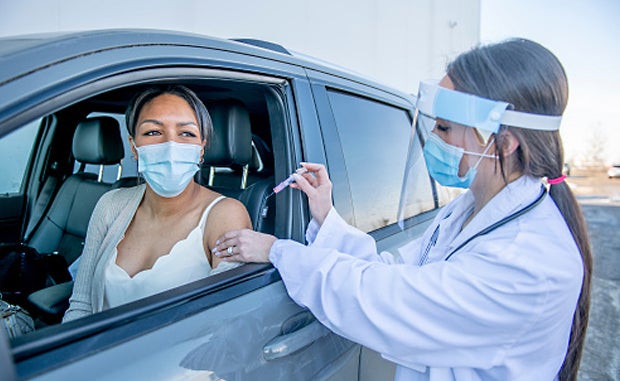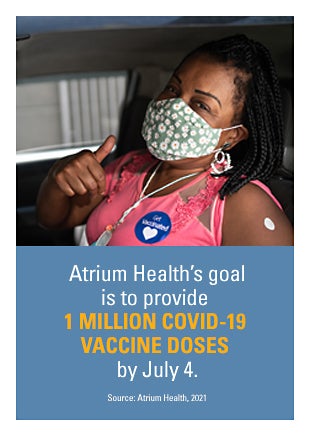

Mass Events Make Vaccines Accessible

On a recent Saturday in South Philadelphia, Tyrique Glasgow volunteered to be a patient ambassador to spread the word about a one-day COVID-19 vaccination clinic being run by Penn Medicine and Mercy Catholic Medical Center in a local gym.
He wanted to do his part after hearing stories of vaccine frustration from fellow members of the Black community who faced challenges in scheduling a vaccination. By 4 p.m. that day, more than 1,000 residents had received a dose of the vaccine, with an orderly check-in process that meant little to no waiting time.
Last month, Atrium Health, a 42-hospital system with 1,500 care locations, staged a similarly efficient two-day vaccination clinic at the Charlotte Douglas International Airport. Conducted in partnership with the airport, the state of North Carolina, the city of Charlotte and American Airlines, Atrium administered more than 4,600 first-dose vaccinations at the event, with recipients scheduled to come back in three weeks for the second dose.
 The event was part of the health system’s larger goal of providing 1 million vaccine doses by July 4. Earlier this year, in partnership with Honeywell, Tepper Sports & Entertainment and the Charlotte Motor Speedway, the speedway served as a mass vaccination site, with Atrium staff delivering 20,000 doses.
The event was part of the health system’s larger goal of providing 1 million vaccine doses by July 4. Earlier this year, in partnership with Honeywell, Tepper Sports & Entertainment and the Charlotte Motor Speedway, the speedway served as a mass vaccination site, with Atrium staff delivering 20,000 doses.
The New Challenge: Improving Confidence in Vaccines
Across the country, hospitals and health systems enter a new phase in combating the pandemic — overcoming some people’s reluctance to take the vaccines. An indication of softening demand for vaccines surfaced recently. Daily vaccinations slowed significantly for the first time since February, a sign that demand is slipping even though all adult Americans are eligible for the shots. About 3 million Americans are being vaccinated daily, an 11% decrease in the seven-day average of daily shots administered over the past week, according to an April 21 Washington Post report.
Increasing public confidence is a massive undertaking, one that will require forging innovative and often nontraditional partnerships to meet patients’ and community needs as providers work to ensure equitable distribution of vaccines. Many hospitals and health systems are reaching deeper into their communities, via churches, schools and other organizations in areas of vulnerable populations, to educate those who have fears or a distrust about the vaccines or who may not have transportation or access to a computer to schedule a vaccination.
Sinai Chicago health system is using community health workers to provide outreach and dispel anxieties about vaccines. Outreach and vaccination sites include gas stations and other local community connectors like pastors and musicians.
Hartford (Conn.) HealthCare has rolled out a mobile clinic that provides vaccinations at homeless shelters and other locations serving vulnerable populations.
4 Tools to Support Vaccination Efforts
The following AHA resources can provide additional inspiration and ideas for expanding community outreach, education and vaccination efforts.
- COVID-19 Vaccine Communications Resources: This AHA webpage provides communication tools for providers and community-based organizations to educate the public about the importance of COVID-19 vaccines.
- Joining Hands for Greater Impact: This new AHA series highlights how innovative partnership have helped in the pandemic response. The site also includes a link to Atrium Health’s “A Leader’s Guide to Safer and More Equitable Community Vaccination Events.”
- VacciNATION: This online resource provides stories about how hospitals are vaccinating the nation through creativity, collaboration and compassion.
- #MyWhy Campaign: Front-line health care workers — from the emergency department to environmental services — share why they chose to get the COVID-19 vaccine.



